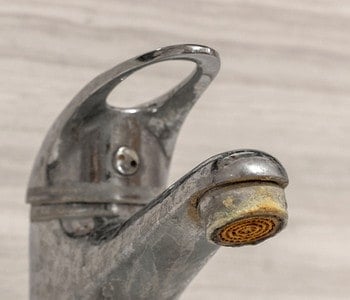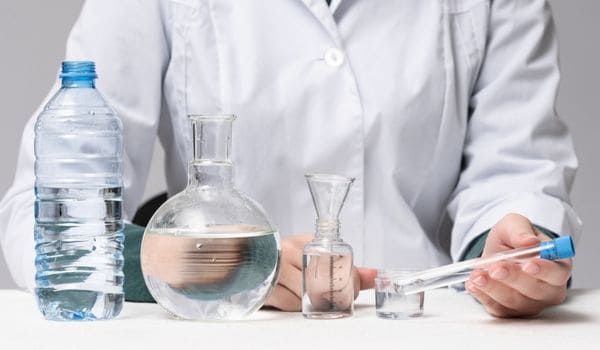
If you’ve ever spotted cloudy glasses, crusty faucets, or dry skin after a shower, hard water might be the culprit. But while it’s rough on plumbing and appliances, does it actually pose a risk to your health?
Let’s unpack what hard water really is, what it can do to your home — and whether you should be drinking it without a second thought.
✅ Quick Takeaways
- 🧂 Hard water is rich in minerals like calcium and magnesium — they’re not harmful, but they do have side effects.
- 🚿 Hard water isn’t harmful, but it can still be a headache — over time, it builds up in pipes, wears down appliances, and leaves behind crusty white stains that are tough to clean.
- 🤧 Some people report skin dryness, irritation, or dull hair from washing in hard water.
- 💧 It’s generally safe to drink, but those with specific health conditions or older plumbing should still consider testing.
- 🧪 Not sure how hard your water is? A simple at-home test or lab report can give you a clear picture.
- 💡 Pro Tip: Even if hard water isn’t dangerous, it can be expensive in the long run. Let’s dive deeper into why.
💧 What Exactly Is Hard Water?

Hardness refers to the amount of dissolved minerals in your water — mainly calcium and magnesium. It’s not harmful, but it does affect how your water feels, tastes — and your plumbing.
Here’s how it’s typically measured:
| 🚩 Symptom | 💡 What It Could Mean |
|---|---|
| 🧼 Dry, Itchy Skin | Mineral residue reacts with soap, leaving buildup on skin and bathtubs |
| 💇♀️ Rough, Dull Hair | Minerals coat strands, creating that “haystack” texture |
| 🍽️ Cloudy Glassware | Calcium dries onto surfaces, leaving behind white spots |
| 👕 Faded, Stiff Laundry | Hard minerals interfere with detergents and wear down fabric |
| 🚰 Chalky Buildup | Limescale forms around faucets, showerheads, and tiles |
| 🌀 Weak Water Pressure | Mineral deposits inside pipes restrict water flow over time |
| 🛠️ Appliance Trouble | Minerals reduce efficiency and shorten the lifespan of water-using devices |
| 💸 Higher Utility Bills | Limescale buildup in heaters makes them work harder and burn more energy |
Even if your tap water looks clear, the signs of excessive minerals often show up elsewhere — on your skin, your dishes, and your utility bills. If a few of these red flags feel familiar, it’s worth taking a closer look at what’s running through your pipes.
💡 Pro Tip: A simple home water test can confirm if your mineral levels are high — and help you decide whether it’s time to consider a softening solution.
🧪 Should You Test Your Water?

If you’re on city water, your annual water quality report should include basic hardness levels. But if you’re on a private well — or want to know more than just mineral content — it’s smart to test it yourself.
- 👉 A DIY test strip can give you a ballpark reading for hardness, but a full lab analysis can help detect contaminants that may interfere with treatment systems, like iron or tannins.
- 💡 Pro Tip: Understanding your water’s mineral profile is the first step to solving issues with scaling, appliance damage, or poor soap performance.
If hardness levels are moderate to high (usually 6 GPG or more), a water softener can make a big difference — protecting plumbing, lowering energy bills, and improving water feel at every tap.
💭 Should You Soften Your Water?

If your tap water leaves your skin feeling dry or your appliances constantly need attention, it might be time to consider softening — but it’s not always a must.
- 📉 Mild mineral content might not cause major problems. But once levels creep above 6–7 grains per gallon, the effects become harder to ignore — especially on plumbing and water-using appliances.
- ⚠️ Many homeowners only realize they have an issue when their water heater breaks or their laundry starts coming out stiff and dull. By then, the damage is done.
- Installing a home water softener can reduce mineral buildup, help appliances run better, and lower future repair bills. If you’re leaning toward a no-salt solution, salt-free alternatives offer a hands-off way to manage scale without changing your water chemistry.
💡 Pro Tip: Whether you go with a traditional system or a salt-free option, start by testing your water so you know exactly what you’re dealing with.
⚖️ Are There Any Downsides to Soft Water?

Softened water can feel like a luxury — smoother showers, fewer stains, better appliance life. But depending on your setup, there are a few trade-offs to consider, especially with salt-based systems.
| ⚠️ Concern | 💡 What to Know |
|---|---|
| 🧂 Added Sodium | Salt-based softeners exchange calcium and magnesium for sodium. The amount is minimal, but worth noting if you’re watching your intake. |
| ⚗️ Metal Leaching | Soft water can be slightly more corrosive, which might lead to metals leaching from older pipes, especially in homes with legacy plumbing. |
| 🐾 Pets & Plants | Some pets dislike the taste, and added salt can interfere with soil chemistry, making softened water less ideal for houseplants. |
For most healthy adults, drinking softened water is perfectly safe. But like any home upgrade, understanding the finer details helps you make a smarter choice — whether that means adjusting your setup or exploring alternatives like Template Assisted Crystallization.
✅ Final Thoughts
Hard water isn’t harmful — but it definitely isn’t harmless. From limescale buildup to lackluster laundry, those extra minerals can wear down your home (and patience) over time.
While it’s safe to drink in most cases, hard water can make everyday tasks feel like a chore — and cost you more in the long run. Whether you choose to soften your water or stick with the minerals, the key is knowing what’s coming out of your tap and how it’s affecting your space.
💡 Pro Tip: Not sure where to start? A quick water test can tell you what you’re working with — and help you decide if it’s time to make a change.
 135 people found this helpful. Was this guide helpful to you?
135 people found this helpful. Was this guide helpful to you? 

